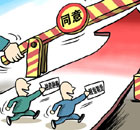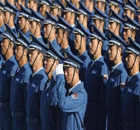Government and Policy
Press conference on central govt's contacts with Dalai Lama (Text)
(Tibet.cn)
Updated: 2010-02-11 11:26
 |
Large Medium Small |
Nyima Tsering: Since the early 1980s, the CPC Central Committee and the State Council have held five National Conferences on Work in Tibet., I participated in three of these conferences. During the period, the Central Government has increased its aid and support to the region in a progressive way. During the period from 2001 to 2008, for example, the Central Government transferred payments in Tibet to the tune of 154.1 billion yuan, accounting for 93.7% of Tibet's total financial revenues in the same period. In other words, of 100 yuan spent by Tibet, some 90 yuan come from the Central Government. There is no one political party like the CPC which is aiding the development of a minority region with resources pooled throughout the country for more than 10 years running. As a cadre of a minority ethnic group, I am deeply moved by what the Central Government is doing. I participated in three of these national conferences and receive benefits from the Central Government aid. The Fifth National Conference on Work in Tibet held recently shows loving care of the CPC Central Committee headed by General Secretary Hu Jintao for us Tibetans. The conference yielded fruitful result. It adopted strategic measures for the fast development of Tibet and to guarantee long-term stability in the region. It is of landmark significance for Tibet in building it into a moderately prosperous society.
Nyima Tsering: If you ask me about Tibet's future, I will tell you: With the loving care of the CPC Central Committee and the State Council, and their special aid and support from people in other parts of China, and with the staunch leadership of the CPC Tibet Committee and the hard struggle waged by the broad masses of people in Tibet, by 2020, the people of Tibet will be able to lead a well-off life, just as people in other parts of China do. Tibet will have a more beautiful tomorrow!
Reporter From South China Morning Post: If the Dalai Lama insists the "Memorandum" be not revised, will there be the next round of talks? When will it be held? Was the recent talks held as proposed by the Beijing side?
Zhu Weiqun: As we have said before, we will not close the door to the talks unless he openly declares "Tibet independence". The "special meeting on the future of Tibet" held in November 2008 made a "resolution" to the effect that if the talks produce no results as they wished, one day they will re-engage in "Tibet independence." Samdhong, the chief bkav-blon of the so-called "government-in-exile" said they were taking the "middle way" but this does not mean they would not have the right to engage in "Tibet independence." It is true that some people in the Dalai clique wish to work for the "Tibet independence". But they know that the balance of forces and the situation do not allow them to do so. Once they believe the situation is advantageous to them, clearly, they will do whatever they please. Under the present situation, our door remains open to the talks. But I have no idea whether the 14th Dalai Lama will close the door himself. Whether there will be the next round of talks depends on the attitude of the 14th Dalai Lama.
Just now, the reporter asked who proposed the recent talks. It is the 14th Dalai Lama who made the proposal. When they have decided not to contact and talk about the resolution, what do you expect us to contact and talk to them?
Reporter from the Journal of the Austrian Side: I have two questions. First, three of you have repeatedly said that the TAR government is the only government that represents the interest of Tibetans. I want to ask if you have ever carried out the survey to learn the view of people in Tibet, especially those ethnic Tibetans as to how they see about Tibet, the "Tibet issue". How to understand the "Tibet issue"?. And my second question is for Mr. Zhu. Just now you said that the Dalai Lama is now 75 years old. And some successors may choose to have the harder line disregard, so I wonder if you have ever done anything to try to learn the view of successors. Are you worried about the possibility whether the "Tibet issue" will become more difficult to solve after the Dalai Lama"
Nyima Tsering: I will answer the first question and then invite Sitar to give some supplements.
Just now, you said the TAR government led by the CCP is the only government who can represent the interests of the Tibetan people. I really agree. I have said the Tibetans regard unity and stability as happiness and separative activities and riots as a disaster. We have already got such a common understanding. More and more Tibetans, me included, think the 14th Dalai Lama is not a pure religious leader. Under the cloak of religion, he is the head of a political group who has long been working to tear Tibet from the motherland and violate national unity. We have once launched a public-opinion poll and released the result on some media. We have expressed our opinion and standpoint when we talked with the private representatives of the 14th Dalai Lama.
Sitar: I want to add a few more words. You once asked whether we know the views of Tibetan people. For the Fifth National Conference on Work in Tibet held recently, the Central Government made full preparations. Efforts were therefore made to know more of the Tibetan folks, especially the Tibetan farmers and herders, as to what they yearn for and how could the Central Government help them. For the past year, the Central Government sent over 300 groups of cadres headed by leaders at the provincial and ministerial level to do investigation in seven prefectures and cities in Tibet and nine Party and Central Government leaders did the same in the region.
I am with the department attached to the Central Government, which is in charge of doing the research for the creation of major policies for Tibet, and therefore often go visit Tibet and other Tibetan-inhabited areas. I can saywith responsibility that the Tibetan people yearn for a better life and the well-off society. They cherish the hard-won happy life and they are afraid of the returning of feudal serfdom featuring temporal and religious administration, because they are unwilling to be serfs and slaves, hate to see their basic human rights they enjoy now be faked away. From bottom of their heart, they know that a powerful country, national unity and social stability are the foundation of their happy life and Tibet's development. Here lies their greatest wish.
Zhu Weiqun: You asked whether it will be more difficult for us to address the "Tibet issue" after the death of the 14th Dalai Lama. This is an interesting question. It is my habit to answer questions in a direct way and I will also give you a very direct answer.
To begin with, on such occasions as the news conference, it's impolite for us to discuss something about the death of an old man in his seventies. As in Chinese customs traditions, we usually try to avoid such topic. The 14th Dalai Lama is such kind of person who had met Chairman Mao Zedong, so we do hope that he can enjoy a long life. And we do hope that in his remaining years, he can prepare well for his own future. Actually, he must be very clear that some foreign forces are flattering him or supporting him. They are actually doing a deceit to him instead of helping him. Some foreign forces urged him to carry out anti-china activities. Now more than 50 years have passed since the 1959 armed rebellion, the 14th Dalai Lama has achieved nothing. The only result is that he is now further and further away from home. The present status quo and future of Tibet depend on the decision by the people across China, including the Tibetans, and will not be changed simply because whether the 14th Dalai Lama is with us or not. Some friends asked me whether we worry about violence and extremist tendencies among the overseas Tibetans when the 14th Dalai Lama has left. We have intensive connections with Tibetans aboard, and we have learned that the majority of them only want to lead a happy and stable life overseas, and want to have exchanges with their relatives and friends in Tibet. Some of them even want to contribute to the development of Tibet. They will not give any support to the violent or terrorist activities. So we would like our foreign friend to know thist. Of course, we can not rule out the possibility about the violent and terrorist happening. But again, I would urge them to have a look at our history from which they will understand that such moves will end in failure. If they want to involve in violence or terrorism, they could no longer keep the title of "pacifists" and "non-violent forces". They will be classified as the terrorists. So, your question is something that those close to the 14th Dalai Lama should think about what they should do one day when the Dalai Lama is not with them.
Guo Weimin: So much for today's press conference. Thank you!







